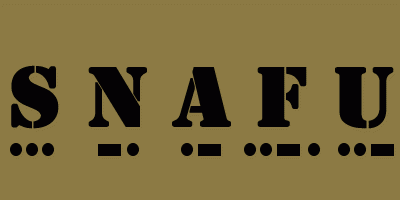
Snafu
“It seems we have a bit of a snafu here…”
Snafu has become one of those words that have entered everyday use, but a lot of people don’t know that it is actually a military originated acronym. Situation Normal, All Fouled Up (yes, I am using that more polite f-word, this is a family blog.) It has been said that the acronym can be traced back to 1941, with the other f-word with fouled taking its place in civilian outlets in 1942. But maybe that is not the case…
There are some indications that at the very least the phrase itself was in use in the mid to late 19th Century and was used by telegraph operators out west. Native tribes were known to either cut the telegraph lines or tear down the poles causing repairmen to have to go out and find the break. When they did the would hook up their portable set and report back, Situation Normal (meaning the vandals were gone), All Fouled Up (indicating the lines were indeed down.) sending this via telegraph would fit in with the terse phrasing of such messages. This could be more allegorical, but it would certainly make a more interesting take on this common phrase.






![By Edward Eggleston, Elizabeth Eggleston Seelye (Tecumseh and the Shawnee Prophet) [Public domain], via Wikimedia Commons Run the Gauntlet](https://i0.wp.com/historiamilitaris.org/wp-content/uploads/Running_the_gauntlet.jpg?resize=474%2C760&ssl=1)

